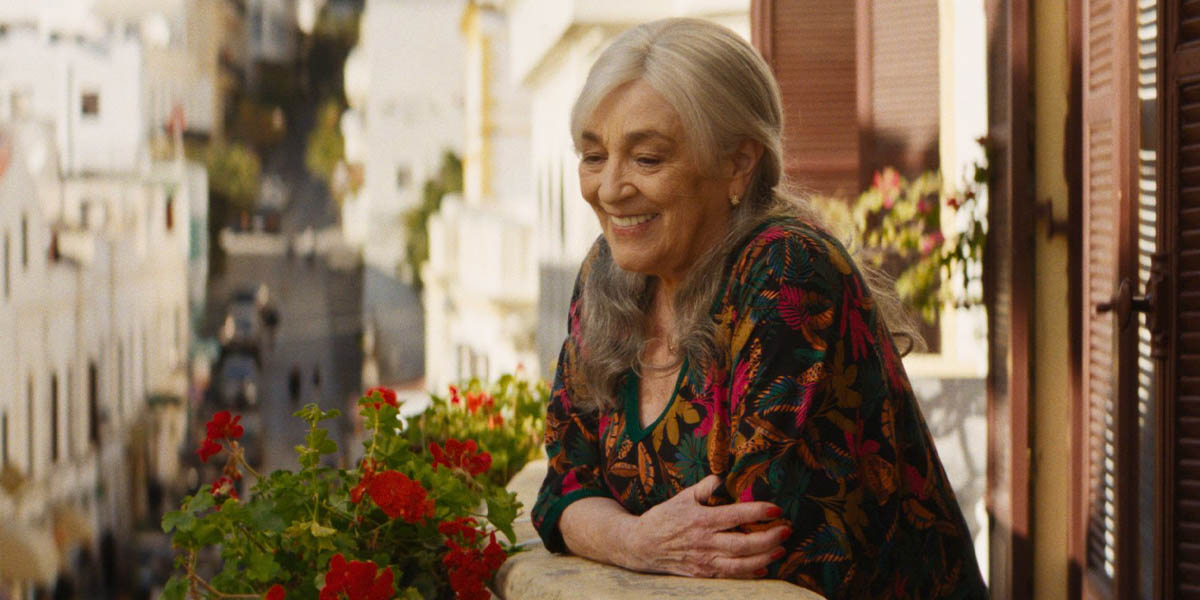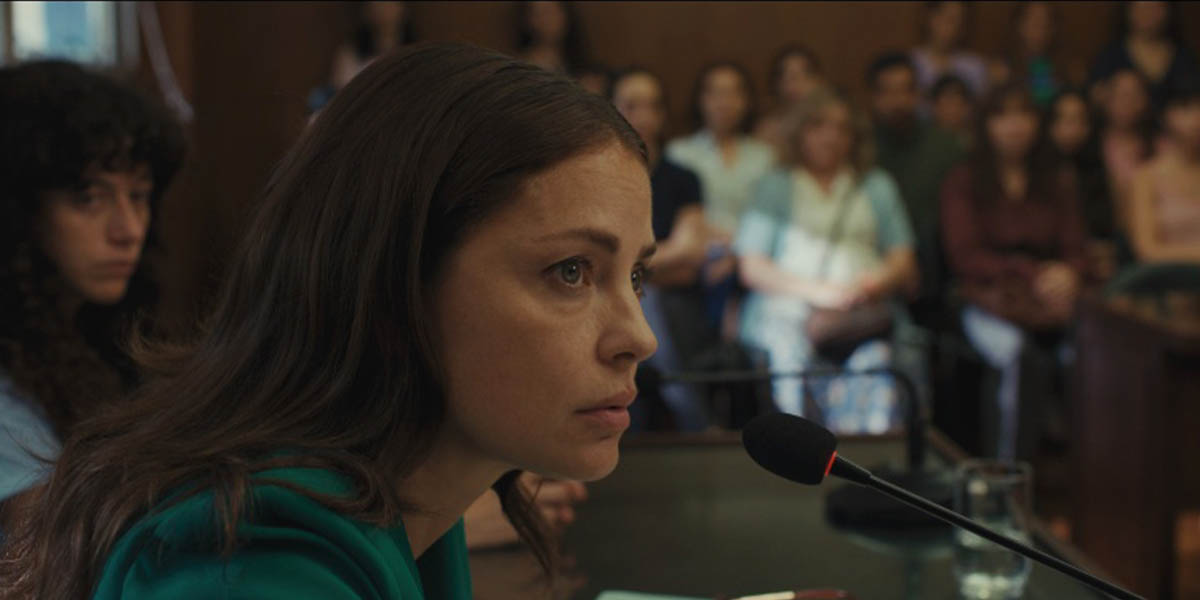The 61st edition of the Chicago International Film Festival has boasted an unusually strong lineup of high-quality titles from around the world, including such significant works as “The Secret Agent,” “The Mastermind,” and “It Was Just an Accident.” However, if I had to pick just one favorite, I would have to go with “Silent Friend.”
Ildiko Enyedi’s wildly ambitious and audacious new film tells three intertwining stories in timelines spread out over the course of an entire century, each shot in a different format designed to evoke their respective eras. They share a common locale, and each narrative involves scientific inquiry, technological ambition, and the deep connection between humans and plant life. This is particularly evident with the large ginkgo tree located in a German botanical garden, which winds up becoming one of the film’s most fascinating characters.
In the earliest storyline, set in 1908 and shot in 35mm black-and-white, a young woman named Grete (Luna Wedler) is first seen applying to become the first female science student at Germany’s University of Hamburg, facing a group of older male professors who turn their interview with her about her knowledge of plant classifications into a creepy and leering inquiry about her sex life.
It is meant to be a humiliation, but Grete stands her ground and ends up being admitted into the school. Before long, however, she is kicked out of the room she is renting due to a misunderstanding. She then takes a job as the assistant to a local photographer, which leads her to develop an interest in botanical photography that will help her find her place in the world.
The next story, shot in grainy 16mm color, takes place in 1972 and follows Hannes (Enzo Brumm), a literature student from the sticks who feels out of place amidst his more privileged and overtly revolutionary classmates. Before long, he is befriended by botany student Gundula (Marlene Brown), and when she has to leave on a trip, she entrusts him with the care of a geranium that is a key part of her studies, and the connection that he gradually develops with it helps to inform his feelings for her.
In the last story, shot on digital and set in 2020, visiting neuroscientist Tony (Tony Leung) has his work studying the brainwaves of pre-verbal babies shut down with the arrival of COVID and, with nothing else to do, he decides to shift his focus from infants to the aforementioned ginkgo tree to try to tap into its stories past with the remote help of French botanist Alice (Léa Seydoux) in experiments that raise the suspicions of a security guard on the nearly-abandoned campus, who suspects that he is up to no good.
This may sound staggeringly pretentious, I suppose, but I assure you that it is anything but that. It runs 147 minutes, and every single one of them is absolutely compelling. From a visual standpoint, it consistently offers a feast for the eyes, whether through the use of different shooting styles, the striking framing in many shots, or the colorful abstract imagery meant to represent the electrochemical life hidden inside that gingko tree. (This is one of those films that demands to be seen on the biggest and best screen possible.)
Dramatically, it is equally strong as Enyedi takes the three storylines, each of which is interesting enough to support its own feature, and weaves them together in a way that allows each to inform the other and explore the central idea of mankind’s ongoing relationship with nature without overly belaboring the point or offering easy resolutions. The performances, from old pros like Leung and Seydoux to relative newcomers like Wedler and that gingko tree, are compelling and bring a distinct, necessary human element to a story that could have become too much of an intellectual exercise in the wrong hands. “Silent Friend” is a true original, one of those cinematic events that, once seen, will not be easily forgotten.

By comparison, Maryam Touzani’s “Calle Malaga” is a far more conventional and audience-friendly piece of cinema, though one that ultimately proves to be effective as well. It centers around Maria Angeles (Carmen Maura), a woman of a certain age whose family fled from Spain to Tangier to escape the Franco dictatorship. She has lived in her adopted home city all her life, the last twenty years as a widow.
Her contentment is shattered upon the arrival of her only child, Clara (Marta Etruria), from Madrid, who informs her that because of the financial impact of her recent divorce, the apartment, which is in Clara’s name, needs to be sold immediately—Maria Angeles can either move in with her daughter in Madrid or take up residence in a local nursing home. Refusing to leave the city that she has known all her life, she opts for the latter.
Still, when that unsurprisingly doesn’t work out, she hatches a plot to essentially squat in her now-vacant apartment, even managing to get the antique dealer (Ahmed Boulane) who bought all her furniture to bring back her stuff, which eventually kicks off a tentative romance between the two. It can’t last, of course, but Maria Angeles certainly does her best, even turning the place into a temporary watering hole for locals to watch soccer matches.
On the surface, the film is pretty formulaic and innocuous, the kind of thing where you can practically see the American remake in your mind even as you are watching it. There is not much in the way of surprise in the screenplay devised by Touzani and co-writer Nabil Ayouch, the conflict between Maria Angeles and Clara is sketchily drawn, as is Maria Angeles’s friendship with a mute nun (Maria Alfonso Rosso), and the final moments try to make a shift to dramatic ambiguity that just does not jibe particularly well with what has come before it.
But even though it is not particularly great or profound or original, it is still undeniably entertaining, and that is due almost entirely to the presence of the legendary Maura in the central role. She is, of course, most famous for her collaborations with Spanish auteur Pedro Almodóvar, including such favorites as “Law of Desire,” “Women on the Verge of a Nervous Breakdown,” and “Volver.”
This film isn’t nearly as ambitious as those, but as a vehicle for Maura’s still-considerable star quality, it works. She is onscreen for virtually the entire film and serves as a delightful center, gently but firmly dominating the proceedings and turning an otherwise familiar project into an undeniable crowd-pleaser.

The Argentinian film “Belén,” from director Dolores Fonzi, also offers viewers a relatively familiar narrative, though one of a far darker and angrier nature. Based on a true story, it opens in 2014 as a young woman (Camilla Plaate) is brought into a hospital by her mother, suffering from abdominal pain. After a cursory examination, she goes to the bathroom. When she returns, she is bleeding heavily from what proves to be the miscarriage of a fetus she was unaware she was even carrying. She is handcuffed to her bed and arrested for murder—abortion was still illegal in Argentina, and the belief was that she did this to herself.
After spending two years in jail, she goes on trial and, following a perfunctory defense from a court-appointed lawyer who barely seems to care, she is given an eight-year sentence for the crime of “aggravated homicide due to kinship.” Another lawyer, Soledad Deza (played by Fonzi herself), hears about the case, is suitably outraged by what she learns and is determined to get justice for her client, who is now dubbed “Belén” to protect the privacy of her and her family, overcoming any number of personal and professional obstacles in her efforts and helping to inspire a grassroots feminist protest movement along the way.
The opening sequence, chronicling the woman’s nightmarish hospital visit that sees her arriving as a patient and leaving as a prisoner, is undeniably gripping and enraging. However, once she is sentenced, the film shifts its focus to Deza and her attempts to battle bureaucracy and hostile forces to make the world aware of her client’s plight, hoping to get her freed after an appeal. This stuff is handled well enough, I suppose, but Fonzi never quite finds an approach to the material that allows it to stand out from many other films about one person going up against the system.
Once the focus moves to Deza and her efforts, Belén gets pushed to the sidelines, and we don’t really get too much of a sense of how she feels about the massive injustice that has been done to her. The film conveys a palpable sense of anger and frustration about how easily the fundamental rights of roughly half the people on the planet can be overlooked or ignored, depending on who is in charge and who is paying attention.
from Roger Ebert https://ift.tt/trYFw5O

.png)
.png)

